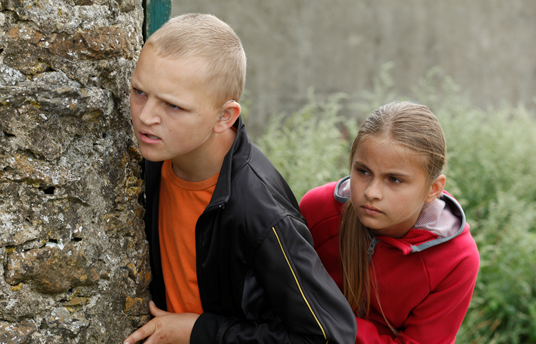Li'l Quinquin (P'tit Quinquin)
Modern Masters

Bruno Dumont / Feature Narrative / France / 2014
In English, French / Arabic, English subtitles
Interests: Comedy, Crime, Mystery
Rated: Mature subject matter which may not be suitable for minors. Parental guidance is strongly advised.Individuals under the age of 15 are not admitted into cinemas.
- Come back soon to see screening dates
Synopsis
Broadly, director Bruno Dumont’s body of work is provocative, at times controversial, occasionally grotesque and always hard-hitting. Eschewing traditional screenwriting methods, his scripts are adapted from stories first written as complete novels; he also manipulates standard narrative techniques, instead relying on methods that make use of atmosphere and situation as much as, if not more than, events and dialogue.
This has led to films that are brilliantly dark, brooding and seething with foreboding – Roger Ebert once wrote that Dumont ‘shoots through a lens filter called “abject Gallic misery”’, referring as much to the blandly beautiful countryside of the north of France where Dumont’s films are invariably set as to the tone of his stories. With ‘Li’l Quinquin’, however, Dumont turns this on its head, taking his traditional story elements and creating a very dark and unsettling comedy.
The murder of a farmer’s wife starts the story off, but the circumstances of her demise are as ridiculous as they are horrendous. The title character, an incorrigible, mouthy and racist youngster, is surrounded by adult figures who are not so much dysfunctional as they are non-functional, their blank stares suggesting a universal state of near-idiocy – chief among them the head of the gendarmerie, whose bumbling attempts to solve the crime take second place to his spouting platitudes about police work and stroking his own ego. Dumont’s is a universe of violence, bewilderment and life’s unpleasantness – to find comedy here is a stroke of genius.
About the Director

Hovering on the border between realistic drama and the avant-garde, the films of Bruno Dumont have defined a new narrative idiom in world cinema. Known for writing complete novels that form the basis of his films, Dumont is deeply influenced by the fine arts that are reflected in the visual richness of his cinema. Deeply influenced by Greek and German philosophy, his films are festival favourites.
Born in 1958 in France, Dumont taught philosophy before his debut in cinema, when he wrote and directed The Life of Jesus (La Vie de Jésus) in 1997. The film won the FIPRESCI Prize at the Chicago International Film Festival, a Caméra d’Or Special Mention at the Festival de Cannes and was named Best New International Feature at the Edinburgh International Film Festival, among other honours.
His second film, Humanité (1999) won the Grand Prix for both Best Actor (Emmanuel Schotté) and Best Actress (Séverine Caneele) at the Festival de Cannes, while Flanders (2006) clinched the Grand Prize of the Jury at Cannes. In addition to several shorts, Dumont has directed nine feature-length films, the most recent being Slack Bay (Ma Loute) (2016), starring Juliette Binoche. He served as the President of the Caméra d’Or jury at the Festival de Cannes in 2008.
Credits
- Director
- Bruno Dumont
- Screenwriter
- Bruno Dumont
- Producer
- Jean Bréhat, Rachid Bouchareb,
- Editor
- Bruno Dumont, Basile Belkhiri
- Cinematographer
- Guillaume Deffontaines
- Sales Company
- Luxbox
- Production Company
- 3B Productions, ARTE France
- Cast
- Alane Delhaye, Lucy Caron, Bernard Pruvost, Philippe Jore